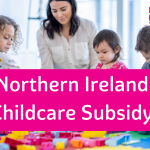This National Work Life Week find out more about how to support your employees with flexible working
National Work Life Week (10 to 14 October) is an annual, national campaign aimed at getting employers and employees talking about wellbeing at work and work-life balance.
At Employers For Childcare, this is something we talk about with employers and parents every week – but this week marks a particularly good opportunity to highlight how enabling parents to balance their family and their career is good for business and good for our economy. We know that, for working parents, flexible working isn’t just a ‘nice to have’ – it is a top priority that can make all the difference when choosing an employer or considering future career moves. This is even more critical for employers in the current tight labour market, when many are struggling to fill vacancies and when those contemplating a new job are looking at the entire package on offer, beyond just salary, when choosing who they want to work for.
This has been reinforced by a new YouGov poll commissioned by Working Families and SF Recruitment which has found that:
- over half of working parents in the UK would consider leaving their job if they found another that offered them greater flexibility
- parents are much more likely to apply for roles that list flexible working options in the job advert than those that don’t
- for UK parents overall, flexibility is second only to pay in terms of priorities when looking for a new job, but for mothers, flexibility and pay are tied as the joint top priority.
Importantly, the poll found that employers need to think beyond just home working or hybrid working, and consider the wide range of ways in which staff could benefit from working more flexibly.
Through our work at Employers For Childcare, it is clear that one size will not fit all, and ‘flexible working’ should not be used interchangeably with ‘working from home’ – there are countless options to meet the needs of employers and their employees – from compressed and annualised hours to flexible start and finish times, hybrid working, and even a four day working week (a major six month pilot of a four day working week is currently underway in the UK as part of a global initiative – find out more here).
The business case for embracing family friendly working
This research just adds to the business case for employers – benefits to the ‘bottom line’ – which, over the last number of years, has been firmly established. Where the demands of work and family responsibilities compete, rather than complement, this can impact on performance, job focus and attendance, and ultimately, on productivity.
Offering a working environment that is flexible and responsive is a commercially sound way of harnessing the potential of a generation of talented people whose working lives need to dovetail with other roles and responsibilities, boosting the pool of individuals from which to recruit – and retaining them when you have them. When an organisation embraces a family friendly ethos its employees feel understood and valued not just as employees but as parents, grandparents, siblings and grandchildren.
There can also be significant cost savings associated with accommodating requests for flexible working. These can range from salary costs, through job-share requests or a change to working hours, to office costs such as a decrease in stationery, furniture, rent or even coffee.
There is also an important role for Government to play here, in encouraging and supporting an environment where flexible working is embraced. In Northern Ireland, this will include the development and introduction of a ‘Better Jobs Pledge’ as part of the new Skills Strategy.
During the current cost of living crisis, it is also important to reflect on how flexible working arrangements could benefit staff who are struggling, whether through reducing their costs, or through opening up opportunities for those who have caring responsibilities. Embracing flexible working can help to reduce travel costs for staff who are working from home for example, or help staff manage their use of childcare, and ultimately enable them to better balance their work and home lives.
So this National Work Life Week, we are encouraging all employers to open up a conversation with their staff, and to create a culture that is welcoming of flexible working and embraces it as a ‘norm’ rather than as something considered as exceptional.
Speak to our team for advice and guidance
Our Family Benefits Advice Service can advise employers on the benefits of family friendly and flexible working policies and in understanding employees’ rights in areas such as maternity leave and pay, parental leave and flexible working. To speak to a trained advisor, free and in confidence, email hello@employersforchildcare.org.
Employers For Childcare has also produced a Family Friendly Employer Guide which is available to download from our website here.






